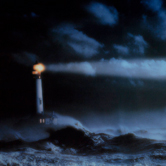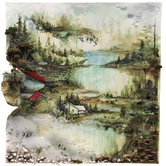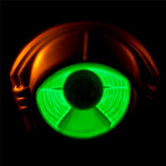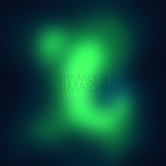Music Reviews, 08/2011
by James Brubaker, Andrew Terhune, and Brian Flota
James Brubaker
Shabazz Palaces | Black Up
Label: Sub Pop
 Shabazz Palaces is Palaceer Luzero. Palaceer Luzero is actually Ishmael Butler of Digable Planets. The third sentence of this review was originally a “call me Ishmael” joke, but then I was reading Larry Fitzmaurice’s Pitchfork review of Shabazz Palace’s first two EP’s, released in 2010, and saw that he made a similar joke so I changed it. At first, Butler’s use of a pseudonym seems a bit unnecessary, silly even. But considering Butler has been around for a while, in both Digable Planets and Cherrywine, it’s easy to understand why he might want to distance himself from his own legacy so he doesn’t have to read a hundred reviews of Shabazz Palaces’ new album, Black Up, that consider this new work in the context of what he has made before. So let’s get that out of the way right here, right now: Shabazz Palaces builds on the chill atmosphere of Butler’s work with Digable Planets, while also bringing in some of the harder, funkier elements of Cherrywine, then puts that combo through some sort of woozy, acid-drenched, seasick, spin-art, spyrograph, whatever-the-fuck machine.
Shabazz Palaces is Palaceer Luzero. Palaceer Luzero is actually Ishmael Butler of Digable Planets. The third sentence of this review was originally a “call me Ishmael” joke, but then I was reading Larry Fitzmaurice’s Pitchfork review of Shabazz Palace’s first two EP’s, released in 2010, and saw that he made a similar joke so I changed it. At first, Butler’s use of a pseudonym seems a bit unnecessary, silly even. But considering Butler has been around for a while, in both Digable Planets and Cherrywine, it’s easy to understand why he might want to distance himself from his own legacy so he doesn’t have to read a hundred reviews of Shabazz Palaces’ new album, Black Up, that consider this new work in the context of what he has made before. So let’s get that out of the way right here, right now: Shabazz Palaces builds on the chill atmosphere of Butler’s work with Digable Planets, while also bringing in some of the harder, funkier elements of Cherrywine, then puts that combo through some sort of woozy, acid-drenched, seasick, spin-art, spyrograph, whatever-the-fuck machine.
The bottom line is, Black Up is one of the most interesting and daring hip hop albums to roll around in a good long while. While most of the genre’s big buzz floats toward the theatrical (Kanye and Jay Z) and the controversial (Kanye and Tyler, the Creator), Black Up is more concerned with combining catchy hooks with unsettled production and smart lyrics for a set of songs that turn culture inside out—bits of jazz float in and around nervous beats, squibbled white noise, and soul grooves that are both inviting, but out of place amidst the otherwise unconventional production. When the soul-sample vocals pop up behind the chorus of “Recollections of the Wraith,” their pop potential is jarring within the otherwise sparse arrangement. That the sample trails off at its end, scuffed and stretched like melting glass, barely noticeable, reminds us that even the things we expect from a hip hop record are going to be a little bit fucked-with on Black Up.
Black Up is an exciting album down to its most miniscule details, be it the burbling synths that echo a trombone sample on “Endeavors for Never (The Last Time We Spoke You Were Not Here. I Saw You Though),” or the syncopated handclaps that buoy the end of “The Kings New Clothes Were Made By His Own Hands.” Every listen of Black Up finds new details rising to the surface and new textures asserting themselves in the mix. If Shabazz Palaces is going to continue making music as smart and engaging as Black Up, Ishmael Butler can call himself whatever he wants. Here’s to Palaceer Luzero.
John Maus | We Must Become the Pitiless Censors of Ourselves
Label: Ribbon Music/Upset the Rhythm
 Synth pop is in. There is no denying that. Had someone said that to me five years ago, I would have thrown shit. Synth pop should have, and pretty much did die by the end of the 80’s. So why have so many intelligent, talented artists latched onto those sounds and textures and, more importantly, why is it that so much of what those artists are making is actually pretty good? Some folks chalk the synth pop revival up as a fad rooted in nostalgia. This approach seems reductive. Sure, some of the synth pop bogging down the servers over at Stereogum and Pitchfork is thinly veiled longing for the past, but then there are albums like Ford & Lopatin’s Channel Pressure and John Maus’ We Must Become the Pitiless Censors of Ourselves. These albums stand out from the fizzy, synthy pack by using retro textures as a jumping off point for sonically daring and challenging songs that contemplate notions of memory and nostalgia rather than simply selling themselves on the basis of familiarity.
Synth pop is in. There is no denying that. Had someone said that to me five years ago, I would have thrown shit. Synth pop should have, and pretty much did die by the end of the 80’s. So why have so many intelligent, talented artists latched onto those sounds and textures and, more importantly, why is it that so much of what those artists are making is actually pretty good? Some folks chalk the synth pop revival up as a fad rooted in nostalgia. This approach seems reductive. Sure, some of the synth pop bogging down the servers over at Stereogum and Pitchfork is thinly veiled longing for the past, but then there are albums like Ford & Lopatin’s Channel Pressure and John Maus’ We Must Become the Pitiless Censors of Ourselves. These albums stand out from the fizzy, synthy pack by using retro textures as a jumping off point for sonically daring and challenging songs that contemplate notions of memory and nostalgia rather than simply selling themselves on the basis of familiarity.
Even this assessment fails to account for everything Maus is doing with his songs. On We Must Become the Pitiless Censors of Ourselves, Maus uses retro synths and gauzy, lo-fi production as a backdrop for disarming melodies, new wave tinged arrangements and oddly transgressive lyrics. The end result, despite the familiar and comfortable new wave flourishes, is an album that manages to be unsettling, fun, and beautiful all at once. At times, as on “Matter of Fact,” which finds Maus repeating the line “Pussy is not a matter of fact,” the album seems to be a willful attempt at pop subversion—the synthesizers and drum machines that propel the song make the vocals feel superfluous until, on about the sixth or seventh listen, the lyrics become disorientingly clear.
But that’s why Pitiless Censors works—it is both playful and crude, lovely, as on the melancholy “Hey Moon,” and sinister, as on “Cop Killer,” uplifting, as on album closer, “Believer,” and obsessively desolate, as on “And the Rain.” Ultimately, despite his reliance on retro 80’s sounds, Maus seems more interested lulling listeners into complacency only to jar them awake with odd lyrics or dark sonic landscapes. All of this is to say that Maus isn’t your run of the mill, synth pop, nostalgia hound. He draws listeners in with the familiarity of those sounds, but the overall effect of this album is one of haunted alienation and existential despair. Thankfully, Maus doesn’t go out of his way to belabor these points. Such feelings simply rise, as if magic, from the songs’ atmospheres. At times, Maus’ songwriting seems to share DNA with Wesley Willis or They Might Be Giants, but more controlled than the first, and much, much darker than the second. And that’s the genius that drives We Must Become the Pitiless Censors of Ourselves—the album presents itself on the surface as an ironic goof, but once we begin to peel away its layers, we are confronted with a profound sense of dread and sorrow that is never named, but lurks inside the electronic mist of Maus’ music, insinuated only as shadows and whispers.
Ford & Lopatin | Channel Pressure
Label: Software
 I want to return to a thread I picked up in my review of Destroyer’s stunning 2011 release, Kaputt—the thread that explores sound as setting, treats sonic landscapes as signifiers of temporality instead of mere homage or irony. This is a necessary thread in a discussion of Ford & Lopatin’s Channel Pressure because, although their style of retro pop is a couple of years removed from Destroyer’s (Kaputt was all late 70’s, early 80’s, and Channel Pressure is all about ’82), and though the overall approach is drastically different, the duo’s debut full length album uses its arrangements in very similar ways to that Destroyer album.
I want to return to a thread I picked up in my review of Destroyer’s stunning 2011 release, Kaputt—the thread that explores sound as setting, treats sonic landscapes as signifiers of temporality instead of mere homage or irony. This is a necessary thread in a discussion of Ford & Lopatin’s Channel Pressure because, although their style of retro pop is a couple of years removed from Destroyer’s (Kaputt was all late 70’s, early 80’s, and Channel Pressure is all about ’82), and though the overall approach is drastically different, the duo’s debut full length album uses its arrangements in very similar ways to that Destroyer album.
But first, a bit of preamble—Ford & Lopatin are Daniel Lopatin, also known as Oneohtrixpointnever, and Joel Ford, a member of Tigercity. Last year, the duo, under the name Games, released a nice enough EP called That We Can Play. Since then, they’ve dropped the Games name in favor of their surnames and holed up at Jan Hammer’s (yeah, that Jan Hammer who composed the theme song to Miami Vice) home studio and jammed. With months of jams at their disposal, the duo patched together an album of retro-futurist pop songs and wrote lyrics about a young musician in the year 2082 who attempts to rebel against a crushing pop music industry “through epic, world-changing MIDI jams,” to quote the album’s press release instead of merely paraphrasing it.
Preposterous? Probably. Every aspect of this project is dripping with absurdity—from the jam sessions cut up and spliced together as songs and the loose narrative thread running through the album to the simple fact that this is yet another album of retro 80’s jams in a market increasingly glutted with such throwbacks, Channel Pressure seems like the type of album that should be unlistenable. But it’s not. And the biggest reason for the album’s success is its largely unironic treatment of its 80’s source material and its use of old sounds to create its story’s setting.
As familiar as elements of Channel Pressure may seem—the primed-for-’82 chorus of “Emergency Room,” for example, or the delicate synth flourishes on “Joey Rogers,”—it is absolutely clear that Ford & Lopatin haven’t set out to make an album of 80’s pop songs. Instead, they’re using familiar textures, rhythms, and melodies—pieces of songs that are of the past—to make something engaging and new. Afterall, the story of Joey Rogers—the album’s “hero”—is set in 2082, a temporal displacement that leads to an update of the early 80’s retro-futurist aesthetic. These songs don’t exactly sound like they’re from 1982, nor (presumably) do they sound like the pop music of 2082—instead, we have a new take on what composers from 1982 might have thought pop music from 2082 would sound like. This is where Channel Pressure pushes our expectations and capitalizes on its sonic setting—it is neither then nor then, there nor there, it is an album dislodged from time, floating between two poles, one hypothetical and the other strange and foreign in an “uncanny valley” sort of way (because let’s face it, early 80’s synth pop is a little eerie, in retrospect, when we consider how completely it missed the mark and defied its own context, but has circled back as an influence and become a self-fulfilling prophecy of sorts).
Channel Pressure then, isn’t just an album of 80’s throwbacks, it’s a time traveler hurtling forward and backward through time, playing with the sounds and texture of the past in an attempt to tell us about the future or, at the very least, about what citizens of the past thought about the future. Along the way, Ford & Lopatin give us some thoroughly enjoyable pop songs (“Emergency Room,” “The Voices,” “Joey Rogers,” “World of Regret,”) some transitional, new agey sound exercises (“New Planet,” and “Dead Jammer”) and even a surprising synth-pop R & B cut with vocals from Autre Ne Veut (“Break Inside”). But the songs aren’t really what this album is about—it’s about time and sound, memory and speculation. And while there is no immediate emotional core contained within the songs, with repeated listens it becomes clear that the listener caught out of time, trying to navigate past and future, is meant to become the emotional core—for the right audience, then, this album is both haunting and hopeful, nostalgic and heroically forward-looking. Sure, several of Ford & Lopatin’s songs are catchy, but it is the sonic and temporal space the duo carves across decades that makes Channel Pressure essential listening.
Andrew Terhune
They Might Be Giants | Join Us
Label: Idlewild/Rounder
 When I was eight years old, They Might Be Giants changed my life. My friend Will had a copy of Flood and upon hearing “Birdhouse in Your Soul” for the first time I was hooked. “Istanbul (Not Constantinople)” was my first lesson in toponymy, “Your Racist Friend” taught me about intolerance, and “Particle Man” well… “Particle Man” was just plain awesome. In the last 21 years not a lot has changed. The band continues to bestow pearls of wisdom no matter what audience they aim for, as they currently split their time between making “adult” music and children’s records. Much of their recent success has come from the latter, which in turn has given Dan Zanes a real run for his money.
When I was eight years old, They Might Be Giants changed my life. My friend Will had a copy of Flood and upon hearing “Birdhouse in Your Soul” for the first time I was hooked. “Istanbul (Not Constantinople)” was my first lesson in toponymy, “Your Racist Friend” taught me about intolerance, and “Particle Man” well… “Particle Man” was just plain awesome. In the last 21 years not a lot has changed. The band continues to bestow pearls of wisdom no matter what audience they aim for, as they currently split their time between making “adult” music and children’s records. Much of their recent success has come from the latter, which in turn has given Dan Zanes a real run for his money.
So for me and most likely many other fans, it seems like TMBG have existed in that odd space between Weird Al and Weezer, and for a while their records usually got lost in the shuffle. Plus I have kids now, so you’re more likely to find me rocking Here Come the 123s than say, 2007’s The Else. While I was a big fan of the 1992 Flood follow-up Apollo 18 and 2002’s kid-friendly No!, it’s been a while since I’ve given a They Might Be Giants record a good, attentive listen.
Their fifteenth album, Join Us, starts off with “Can’t Keep Johnny Down,” which is catchy and fun. After one listen, I found it stuck in my head hours later. Also, the opening lines are surprisingly kick-ass: “Outnumbered a million to one / All of the dicks in this dick town / Can’t keep Johnny down.” The rest of the album more or less follows suit.
While the album does have its share of filler, “Old Pine Box” and “Canajoharie” help the album build momentum early, establishing the band’s standard geek-rock harmonies. In case you were wondering, the band is still really weird. “Cloisonné” centers itself lyrically on a talking raindrop and “Dog Walker” layers guitar fuzz over an electronic soundscape with altered vocals. The guitar-driven feel-gooder “Let Your Hair Hang Down” sounds like a song Tom Petty would have written for Full Moon Fever, if instead of being Tom Petty he and the Heartbreakers were really a bunch of nerds.
While some of these songs are quirky misfires, They Might Be Giants have put together a fairly solid pop album with smart, fun moments. Join Us is a celebration of what the band does best.
Bon Iver | Bon Iver
Label: 4AD/Jagjaguar
 When I first encountered Bon Iver, it was one of those benevolent moments when my friend handed me the disc and just said “Here.” It was the right album at the right time. This piece of music that just materialized before me. How did I ever exist without it? I was depressed and living in Chicago. For Emma, Forever Ago made my treks through the frigid snow seem heroic, and I held onto that album like an anthem. Then I moved to Savannah, Georgia. The ethereal cold of Justin Vernon’s falsetto worked well for such a haunted town, but it never gave me the same impact. It just made me miss Chicago. But now I live in Stillwater, Oklahoma, so I don’t know what to do with my music anymore.
When I first encountered Bon Iver, it was one of those benevolent moments when my friend handed me the disc and just said “Here.” It was the right album at the right time. This piece of music that just materialized before me. How did I ever exist without it? I was depressed and living in Chicago. For Emma, Forever Ago made my treks through the frigid snow seem heroic, and I held onto that album like an anthem. Then I moved to Savannah, Georgia. The ethereal cold of Justin Vernon’s falsetto worked well for such a haunted town, but it never gave me the same impact. It just made me miss Chicago. But now I live in Stillwater, Oklahoma, so I don’t know what to do with my music anymore.
With the personal anecdote now out of the way, it’s safe to say that this album won’t really surprise anyone the way For Emma was able to. This isn’t necessarily a bad thing. After the success of his debut, the Blood Bank EP (a wonderful For Emma post-script), and his collaboration with Kanye West on My Beautiful Dark Twisted Fantasy, Bon Iver became one the most hotly anticipated albums of the year. If For Emma was about sitting alone in the dark, then Bon Iver finds Justin Vernon pulling back the curtain a bit to let the sun shine in. The result of which is another beautiful, lingering musical experience.
The album’s opener “Perth” starts off warm and familiar, but ultimately introduces the listener to more than an extension of Vernon’s trademark sonic landscapes. Halfway through the track, the momentum shifts and builds towards an atmospheric expanse filled with a Peter Gabriel-inspired brass section and a steady beat. This instrumentation is continued throughout and works well juxtaposed with Vernon’s hushed vocals, as Vernon mixes his earnestness with a sort of muted bravado of a soul singer. The album comes in movements and progresses in waves, as no track, with the exception of maybe “Calgary” or “Towers,” seems to stand independently. “Calgary” continues the up-tempo vibe late in the record, while “Towers” dips heavily into a folky, yet still funky, footstomping beat that makes a welcome home for the twanging guitar that shows up midway through. This guitar arrives again amongst an early-80s prog rock sound to close out the album on “Beth/Rest.” This go-round Vernon is more interested in pushing each song to its edges, as he fills and layers his instruments in an effort to eliminate any moments of silence.
Bon Iver feels like an album I would have listened to at dusk, windows cracked and driving slow along the Savannah River headed towards the Atlantic. With each track evoking the feeling of the first and last hour of daylight Bon Iver is a magic hour, an expected, but natural progression – Winter turning to Spring.
My Morning Jacket | Circuital
Label: ATO
 To describe My Morning Jacket’s sixth album as a return to form would be a bit of a stretch, as Circuital represents another progressive step in their continual evolution. That’s a given. This seems to be the usual rhetoric whenever MMJ put out a new album. But it’s true.
To describe My Morning Jacket’s sixth album as a return to form would be a bit of a stretch, as Circuital represents another progressive step in their continual evolution. That’s a given. This seems to be the usual rhetoric whenever MMJ put out a new album. But it’s true.
Here, on Circuital, they’ve taken some of the pizzazz from their bizarrely wonderful 2008 sidestep Evil Urges (which represents the more experimental side of Jim James & Co.) and continued to propel their sonic juggernaut that came to full fruition on 2005’s Z.
My Morning Jacket have a lot going on in their soundscape, with each element coming together to build towards the next movement. While nothing on Circuital matches the power of Z, it does stand on its own as a grand musical gesture towards expansion and innovation with the fuzzy and melodic opening of “Victory Dance” and the title track setting the mood early: these songs will crash down just as quickly as they were built up.
Several moments (“Holdin’ On to Black Metal” and “First Light”) on the album left me longing for James’ voice to hit the level he does live (best captured on 2006’s live album Okonokos), however there’s something to be said for what James can do with restraint on tracks like “Wonderful (The Way I Feel)” and “You Wanna Freak Out.” The soft infections of his voice shine through best in the slow jam “Slow, Slow Tune,” which rolls its groove out thick and mellow.
The closing track “Movin’ Away” is so hauntingly beautiful, it might start replacing the At Dawn opus “Phone Went West” on all my upcoming mixtapes. Circuital is an album that works and works well. Throughout each listen, I found something new, surprises hidden behind each new wave.
Brian Flota
Julianna Barwick & Ikue Mori | FRKWYS vol. 6
Label: Rvng Intl
 In late February, Julianna Barwick released her critically acclaimed second album, The Magic Place. It is her most popular album to date, thanks in part to a stamp of approval from indie-rock icon Sufjan Stevens, who released the album on his label, Asthmatic Kitty Records. The experimental aspects of her musical approach are often masked because of her employment of lush vocal harmonies and musical arrangements that slowly build up to swirling crescendos. What many do not realize is that Barwick’s approach to stacking vocals relies on loop pedals. Now, this isn’t all that uncommon in the age of Animal Collective or Andrew Bird, but it does suggest that Barwick has familiarized herself enough with contemporary gadgetry to create her own specific aesthetic.
In late February, Julianna Barwick released her critically acclaimed second album, The Magic Place. It is her most popular album to date, thanks in part to a stamp of approval from indie-rock icon Sufjan Stevens, who released the album on his label, Asthmatic Kitty Records. The experimental aspects of her musical approach are often masked because of her employment of lush vocal harmonies and musical arrangements that slowly build up to swirling crescendos. What many do not realize is that Barwick’s approach to stacking vocals relies on loop pedals. Now, this isn’t all that uncommon in the age of Animal Collective or Andrew Bird, but it does suggest that Barwick has familiarized herself enough with contemporary gadgetry to create her own specific aesthetic.
Her collaboration with avant-garde music titan Ikue Mori, therefore, should come as no surprise. The resulting album, FRKWYS Vol. 6, is part of a series of collaborative, often improvised live sets released by RVNG Intl. in vinyl-only limited editions. Mori, known to many as the drummer of No Wave legends DNA (which also featured the guitarist Arto Lindsay), has long been a force in experimental music, known for her manipulation of drum machines and other sonic glitchery, as well as her collaborations with Fred Frith, Kim Gordon, Robert Quine, Fred Frith, and Christian Marclay, among others. She shows restraint with Barwick on FRKWYS Vol. 6, giving the relative newcomer the needed musical space for her vocal loop manipulations.
For those expecting The Magic Place Part Two or the tinnitus-inducing noise of Merzbow: you will be sorely disappointed. The improvisations on FRKWYS Vol. 6 are rather placid, the digital equivalent of a light summer rain. Mori’s laptop sonics are constant but never insistent. As a result, Barwick’s vocal interjections arrive as a welcome guest. Her wordless utterances, combined with the percussive, mutilated beats supplied by Mori, are reminiscent of Yoko Ono’s Fluxus experiments on the second disc of her 1970 double-album Fly. In other words, this is not very accessible music to a broader listening public, even to those who own the latest albums by Panda Bear or John Maus. The big difference between the two is that Ono was preoccupied with Janovian catharsis at the time and Barwick appears far more interested in the sublime. By teaming up with Mori, this impulse on the part of Barwick is somewhat tempered, and often for the good, generating a fascinating musical tension between her careful premeditation and the unexpected bleeps and bloops supplied by her collaborator. In the end, FRKWYS Vol. 6 is a fine, but hardly essential, record for fans of Barwick, Mori, or experimental music in general.
Blanck Mass | Blanck Mass
Label: Rock Action
 Blanck Mass is a side-project by Benjamin John Power, who represents one half of the drone-dance duo Fuck Buttons. On his self-titled debut, he deftly blends elements found on the Buttons’ first two albums: their overlooked debut Street Horrrsing (2008), and its slightly more accessible, dancefloor-ready follow-up, Tarot Sport (2009). One notable difference is that Blanck Mass flirts more explicitly with ambient drone soundscapes as he forsakes the percussion that brings an important, driving element to the Fuck Buttons’ records.
Blanck Mass is a side-project by Benjamin John Power, who represents one half of the drone-dance duo Fuck Buttons. On his self-titled debut, he deftly blends elements found on the Buttons’ first two albums: their overlooked debut Street Horrrsing (2008), and its slightly more accessible, dancefloor-ready follow-up, Tarot Sport (2009). One notable difference is that Blanck Mass flirts more explicitly with ambient drone soundscapes as he forsakes the percussion that brings an important, driving element to the Fuck Buttons’ records.
The result is surprisingly effective. Blanck Mass possesses plenty of the dissonance found on Street Horrrsing and Tarot Sport, but generally obscures these harsher tendencies with explicitly liquid textures. Many of the album’s ten tracks—such as the opener “Sifted Gold,” “Sub Serious,” and the thirteen-minute cut “What You Know”—use sonic variations of water, like imitation mountain streams or rain-sticks, to replicate some sort of natural order to the electronic chaos surrounding it. In the end, comparisons to recordings as diverse as the Boredoms’ Vision Creation Newsun, Nadja’s Truth Becomes Death, and Tim Hecker’s recent release Ravedeath, 1972 are not out of line. While Blanck Mass lacks the overwhelming percussive drive of Vision Creation Newsun or the moody brilliance of Nadja or Tim Hecker, the album’s centerpiece, “Land Disaster,” suggests that these comparisons are not that far out of line. Still, Blanck Mass ends up being drum-less drone that you can move to on literal or subconscious dancefloors.
